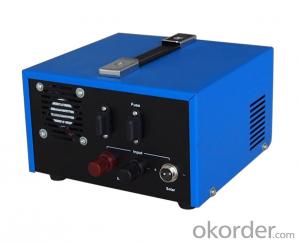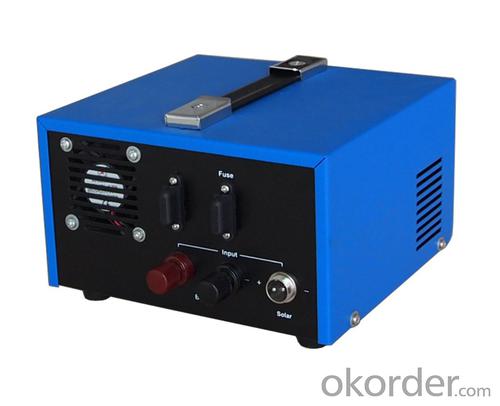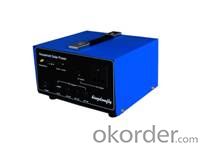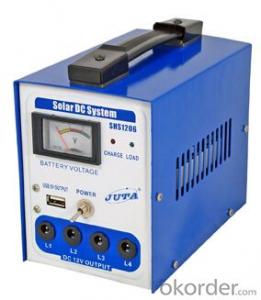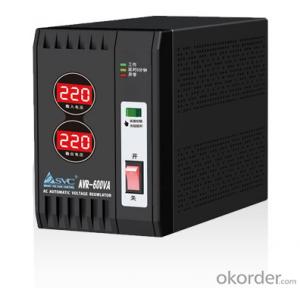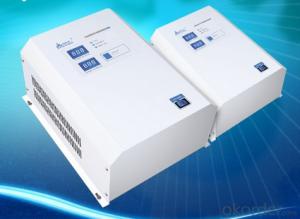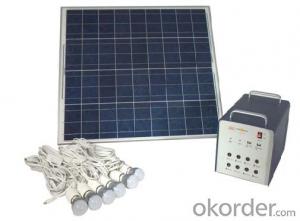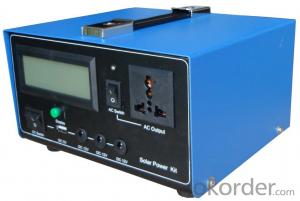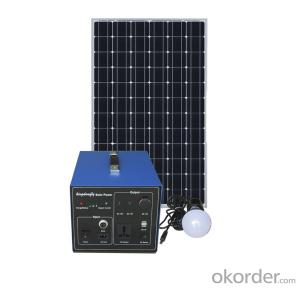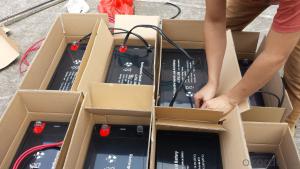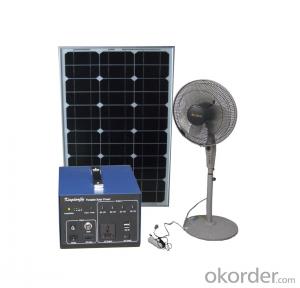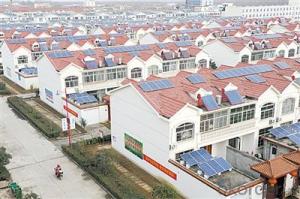Best Residential Solar Energy Systems - SPK_300_LED Solar Power System Hot Selling
- Loading Port:
- China main port
- Payment Terms:
- TT or LC
- Min Order Qty:
- 3 pc
- Supply Capability:
- 10000 pc/month
OKorder Service Pledge
OKorder Financial Service
You Might Also Like
Main Information
KDF SPK_300_LED This product is high performance,family used portable solar power system,which can receive energy and store it in battery outside connected to SPK by solar energy on sunny day,and supplies electric power for varies appliances such as electric fan,lighting lamps, television, portable computer etc.It can supply power for both DC and AC electric application.It’s very helpful and useful for home electric supply.
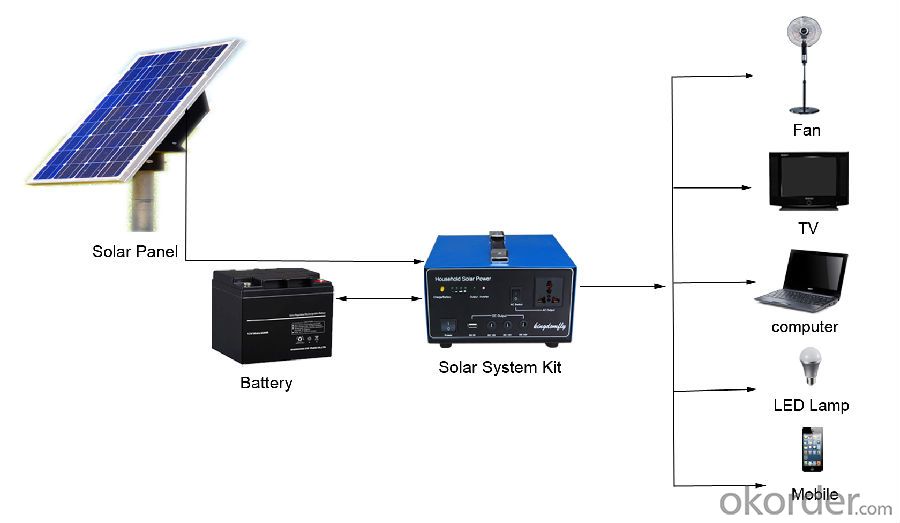
Features:
◆ Battery puts outside connected to the SPK for user to choose battery in recommended range, and easily to exchange battery.
◆ Both DC and AC output
◆ Solar Feedback Circuit Protection
◆ Output Short-circuit Protection
◆ Solar「+」「-」anti-access protection
◆ Output「+」「-」anti-access protection
◆ Over Charged Protection
◆ Over Discharged Protection
◆ Over Load Protection
◆ Over-Temperature Protection
Technical parameters
Specification | Value/Material | |
Item No. KDF | SPK_300_LED | |
Solar Recommended | Specification | Poly silicon |
Working Voltage/Power | 18V80W~120W | |
Battery Recommended | Rated Voltage/Capacity | 12V65AH~100AH |
Specification | Lead Acid | |
Charging Controller | Operating Voltage | 12V |
Input Voltage | 17.3V~21V | |
Input current | MAX:10A | |
Power Consumption | MAX: 5mA | |
Low Voltage Disconnect(LVD) | 10.8V | |
Low Voltage Reconnect(LVR) | 12.3V | |
High Voltage Discharge( HVC) | 14.6V | |
High Voltage Recharge(HVR) | 13.8V | |
Temperature Protection | 60℃ | |
DC Output | DC output & Application | USB 5V2A |
DC output & Application | DC 12V1*3A | |
AC Output | Output Wave | modified sine wave |
Input Voltage | 11V~15V | |
Output Voltage | 110V±10% | |
Output Frequency | 60Hz±2Hz/50Hz±2Hz | |
Rated Output Power | 300W | |
Maximum VA | 600VA | |
Maximum Efficiency | 88% | |
Temperature | 0-40℃ | |
Over Temperature | 60℃~70℃ | |
Low Voltage Alarm | 11V | |
Low Voltage Shut off | 10.5V | |
High Voltage Shut off | 16V | |
Package | Set size | 278*240*172mm |
Set N·W | 2.8kg | |
Set N·W | 3.6kg | |
- Q: Can solar energy systems be used in areas with limited construction materials?
- Yes, solar energy systems can be used in areas with limited construction materials. Solar energy systems can be designed to be simple and require minimal construction materials. For example, small-scale solar systems like solar panels or solar lanterns can be easily installed and used in remote areas with limited resources. Additionally, innovative solutions like solar cookers or solar water heaters can also be implemented in areas with limited construction materials, providing clean and sustainable energy alternatives.
- Q: Are there any noise concerns with solar energy systems?
- Yes, there are generally no noise concerns with solar energy systems as they do not have any moving parts and operate silently.
- Q: Can solar energy systems be used for powering greenhouses?
- Indeed, greenhouses can most certainly utilize solar energy systems for power. The installation of solar panels on the greenhouse's roof or walls allows for the capture of sunlight, which is then converted into electricity. This renewable energy can subsequently be employed to power various greenhouse systems, such as lighting, cooling, heating, and ventilation. Solar energy provides several advantages for greenhouse power. Firstly, it serves as a clean and sustainable energy source, aiding in the reduction of greenhouse gas emissions and minimizing environmental impact. Secondly, solar power is both abundant and reliable, particularly in regions blessed with abundant sunlight. Consequently, greenhouses can enjoy a consistent and uninterrupted power supply, even if they are situated in remote or off-grid locations. Moreover, the integration of solar energy systems can contribute to decreased operating costs for greenhouse owners. After the initial investment in solar panels and equipment, ongoing energy expenses are significantly lower compared to traditional fossil fuel-based systems. This can result in substantial long-term savings, particularly for larger-scale commercial greenhouses. Additionally, solar energy systems can be combined with energy storage solutions like batteries to store excess energy generated during daylight hours. This stored energy can then be utilized during overcast periods or at night, ensuring an uninterrupted power supply for the greenhouse. In conclusion, solar energy systems are a viable and sustainable choice for powering greenhouses. They offer a multitude of advantages, including reduced environmental impact, a reliable energy supply, cost savings, and the ability to integrate with energy storage solutions.
- Q: Can solar energy systems be used in camping or outdoor activities?
- Yes, solar energy systems can be used in camping or outdoor activities. Portable solar panels, solar-powered lanterns, and solar chargers for electronic devices are some examples of solar energy systems that are designed for outdoor use. These systems harness the power of the sun to provide renewable energy, making them an eco-friendly and convenient solution for powering equipment and devices during camping or other outdoor activities.
- Q: Can solar energy systems be used in powering dental clinics or medical clinics?
- Yes, solar energy systems can be used to power dental clinics or medical clinics. Solar panels can be installed on the roofs of these facilities to capture sunlight and convert it into electricity, which can be used to meet their energy needs. This not only helps to reduce their reliance on fossil fuels but also provides a clean and sustainable source of power. Additionally, solar energy systems can be designed to store excess energy for use during non-sunlight hours, ensuring a continuous power supply for critical medical equipment and operations.
- Q: Can solar energy systems be used for electric vehicle charging stations?
- Yes, solar energy systems can be used for electric vehicle charging stations. By installing solar panels, the energy generated from the sun can be used to charge electric vehicles, making them more sustainable and reducing dependency on traditional energy sources. This integration of solar energy and electric vehicle charging helps promote renewable energy and contributes to a greener transportation system.
- Q: Can solar energy systems be used in areas with frequent lightning strikes?
- Yes, solar energy systems can be used in areas with frequent lightning strikes. However, it is essential to take proper precautions to protect the system from potential damage caused by lightning strikes. This can be achieved by using lightning arrestors, surge protectors, and grounding systems to minimize the risk of electrical surges and ensure the safety and integrity of the solar energy system.
- Q: Can solar energy systems be used in powering wastewater treatment plants?
- Solar energy systems have the capability to power wastewater treatment plants. This clean and renewable source of electricity can be harnessed through the utilization of solar panels, which capture sunlight and convert it into usable power for the various processes within a wastewater treatment facility. There are several advantages to employing solar energy systems in the operation of wastewater treatment plants. Firstly, solar power is abundant and accessible in most regions, making it a dependable energy source. This reduces reliance on fossil fuels and helps mitigate the environmental impact associated with conventional energy sources. Additionally, solar energy systems require minimal maintenance and have low operational costs compared to traditional power sources. Once the initial investment in solar panels is made, ongoing expenses are significantly reduced, resulting in long-term cost savings. Moreover, solar-powered wastewater treatment plants contribute to the reduction of greenhouse gas emissions. By transitioning to renewable energy, these facilities can greatly decrease their carbon footprint and aid in the fight against climate change. Furthermore, solar energy systems can be easily integrated into existing wastewater treatment plants, powering vital components such as pumps, motors, and aeration systems necessary for the treatment process. However, it is crucial to consider the specific energy requirements of each wastewater treatment plant when implementing solar energy systems. The size and capacity of the solar panels must be carefully determined to ensure consistent generation of sufficient electricity to meet the plant's needs. In conclusion, solar energy systems are indeed capable of powering wastewater treatment plants. They offer numerous benefits including cost savings, reduced environmental impact, and seamless integration. As the world continues to prioritize sustainable energy solutions, solar-powered wastewater treatment plants are gaining popularity and are a significant step towards a greener and more sustainable future.
- Q: Household solar power generation system prices about how much, want to install a set, do not know what the price, in addition, there are manufacturers in this area can recommend it? Thank you
- Photovoltaic power generation system can not buy cheap, cheap product quality is not good to use expensive. Photovoltaic power generation system can be used to invest in financial products, general household photovoltaic system 7~9 can recover the cost of power system can be used for more than 25 years, 25 years after the power attenuation of about 20%, if the poor quality of the products are generally 2~3 years can be reduced by 20% and must keep their eyes open several more formal manufacturers so when buying light V system, quality quality assurance production factory.
- Q: Can solar energy systems be used for powering airports?
- Yes, solar energy systems can be used for powering airports. In fact, many airports around the world have already started utilizing solar power to meet their energy needs. Solar panels can be installed on airport rooftops, parking lots, and unused land areas, providing a sustainable and renewable source of electricity to power various operations such as lighting, heating, cooling, and even charging electric ground support equipment. Additionally, solar energy systems can help airports reduce their carbon footprint and dependency on fossil fuels, making them more environmentally friendly and cost-effective in the long run.
Send your message to us
Best Residential Solar Energy Systems - SPK_300_LED Solar Power System Hot Selling
- Loading Port:
- China main port
- Payment Terms:
- TT or LC
- Min Order Qty:
- 3 pc
- Supply Capability:
- 10000 pc/month
OKorder Service Pledge
OKorder Financial Service
Similar products
Hot products
Hot Searches
Related keywords
